A key constituent of the opposition People’s Alliance coalition led by Anwar Ibrahim has opened secret talks with Umno threatens the stability of the fragile five-month-old opposition alliance.
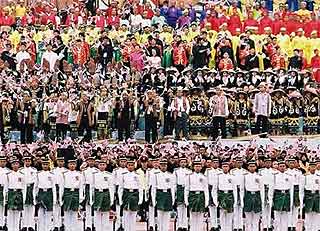 The Pan Malaysian Islamic Party or PAS, a senior partner in the three-party coalition, is increasingly unhappy with Anwar’s multi-racial and openly secular platform. It feels the coalition is not giving pre-eminence to Islam and priority to Malays, who form 60 percent of the population of 27 million.
The Pan Malaysian Islamic Party or PAS, a senior partner in the three-party coalition, is increasingly unhappy with Anwar’s multi-racial and openly secular platform. It feels the coalition is not giving pre-eminence to Islam and priority to Malays, who form 60 percent of the population of 27 million.
Until recently PAS was a dominant opposition party that existed as a defender of Islam - a role which was eclipsed by Anwar’s PKR.
After the Mar 8 general elections, which saw Barisan Nasional government losing five state governments and its 40-year-old two-thirds majority in parliament, PKR emerged as the main opposition.
The Chinese-based secular DAP emerged close behind the PKR and together they dominate the People’s Alliance to the detriment of PAS and its avowed aim to set up an Islamic theocracy in this multi-ethnic society. This puts it in conflict with the liberal policies of both the multi-racial PKR and the entirely secular DAP.
The coalition-ruled five states espouse the common values of transparency, accountability and justice.
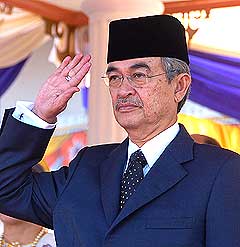 “We have had three rounds of talk with PAS on Malay unity and Islam,” Prime Minister Abdullah Badawi told local media on Tuesday in a political bombshell announcement that has rattled the opposition coalition.
“We have had three rounds of talk with PAS on Malay unity and Islam,” Prime Minister Abdullah Badawi told local media on Tuesday in a political bombshell announcement that has rattled the opposition coalition.
The talks centre on ways to work together to "save" the Malay-Muslim race from domination by non-Muslims and to safeguard and promote Islam in the wake of the changes brought by the March election.
Their discussions may have opened a new rift in the opposition camp which is already reeling from the fallout of a fresh sodomy scandal involving Anwar.
Police are investigating a report lodged by an aide of Anwar on June 28 that the opposition leader forced himself on him. The charge is widely seen as a repeat of the 1998 charges that saw the former deputy prime minister end up in jail for six years.
'Landscape altering'
“The talks between the two bitter political rivals have far-reaching implications that could alter the country’s political landscape if it succeeds,” said a senior Universiti Kebangsaan Malaysia academic who is consulted by the government.
"The three parties in the opposition alliance are so dissimilar in their orientation that it is only a matter of time before they disagree and the cracks show up," he told IPS in an interview.
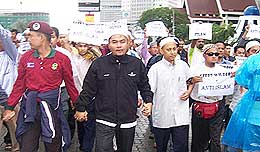 He said it is natural for Umno, an ethno-Malay nationalist organisation and PAS, a wholly Islamic party, to get together. "There are common grounds because both are one way or other looking after Malay Muslim rights,’’ the academic told IPS.
He said it is natural for Umno, an ethno-Malay nationalist organisation and PAS, a wholly Islamic party, to get together. "There are common grounds because both are one way or other looking after Malay Muslim rights,’’ the academic told IPS.
One impetus for the talks is a fear among the influential Malay intelligentsia that - rightly or wrongly - the pre-eminent position of Malays in the political establishment is under threat from the Chinese and Indian minorities following the general election.
Since then numerous Malay community leaders have stepped forward and banded together to form grassroots organisations whose aim is to "protect" the rights of Malays and Islam from further erosion, and if possible recover lost ground.
The Malay intelligentsia, in numerous articles in the national Malay dailies and Malay literary periodicals, along with mushrooming grassroots organisations, have been piling pressure on Umno and PAS to sink their differences and work together.
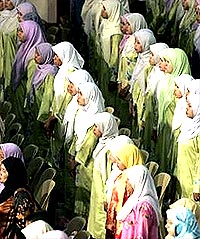 Early May, about 200 Malay NGOs led by the Federation of National Writers Association or ‘Gapena’ met for three days to discuss the "crisis" in Malay society as a result of the election.
Early May, about 200 Malay NGOs led by the Federation of National Writers Association or ‘Gapena’ met for three days to discuss the "crisis" in Malay society as a result of the election.
Later, these and other Malay organistions came together to form the Malaysian Malay Solidarity Council whose leading lights include Gapena chairman Ismail Hussin and other influential academics, writers and poets.
Malay grassroots concerns revolve around three issues: the future of Malay political pre-eminence, the future prosperity of Islam and the status of the traditional Malay rulers.
Constitutional protection
"We are merely bowing to grassroots pressure to come together for unity talks," said a senior PAS leader who asked not to be identified. "We are keeping our options open and are prepared to listen to anybody. Speculation that we are leaving the opposition People’s Alliance coalition is wholly unfounded."
For Anwar’s PKR the Malays did not lose in the Mar. 8 election and any fears that non-Malays are "swarming" over them are unfounded. "For us Malaysia won the day and a two-party system was born and no race lost anything," said PKR deputy president Dr Syed Husin Ali.
"It was Umno that lost, not the Malays," he told IPS in a recent interview.
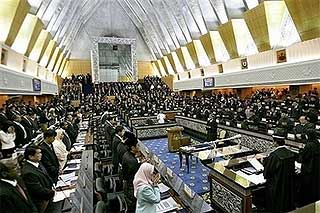 Other PKR leaders say there are now more Malay lawmakers in parliament than before, only that they are spread out in several political parties and that they have not lost their political clout.
Other PKR leaders say there are now more Malay lawmakers in parliament than before, only that they are spread out in several political parties and that they have not lost their political clout.
They also point out that the position of Malays, Islam and the Malay rulers is enshrined in the Constitution and guaranteed and not subject to the political fortunes of Umno.
Nevertheless the Malay grassroots see PKR as overly dominated by non-Malays and Anwar as "too secular and ambiguous" on Islam and Malay rights to ever effectively champion their cause.
"These are the reasons why the Malay intelligentsia is looking for leadership in a possible rapprochement between the nationalist UMNO and the Islamist PAS," said the UKM academic.
"If the arch rivals unite under a common Malay-Islam agenda there is every likelihood that Malaysia’s political landscape will change radically to the detriment of the growing secular multi-ethnic democracy," he said. - IPS

